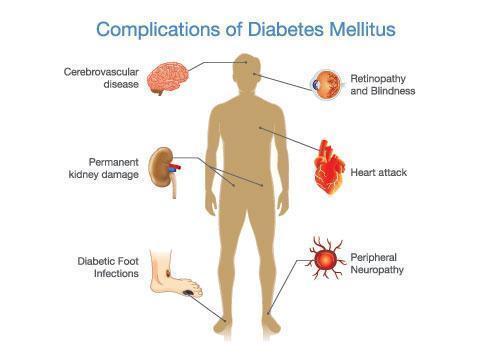Last updated on January 31st, 2022
Summary
Diabetic neuropathy is a condition that causes nerve damage. It develops slowly. There are different types of neuropathies that affect various nerves in your body. Thus, you can get a variety of symptoms. A study done in 2018 reveals there were more than 82.5 lakh hospital discharges with diabetes-related complications. If you are wondering about “Can diabetic neuropathy be reversed?” then yes. You can reverse your neuropathy through lifestyle changes, diet management, and controlling your blood glucose levels. Some effective medications and home remedies can treat diabetic neuropathy.
Once you develop diabetes, there are higher chances of developing various kinds of health issues. Some illnesses are mild and can go off easily, whereas some are quite serious. They can even prove fatal to the life of the patient. Among the health problems that people with diabetes face, heart, liver, and kidney diseases are common. Another type of the most common complication that people with diabetes type-1 and type-2 face is Diabetes neuropathy. It is a disease related to nerve damage due to high blood sugar levels.

What is Diabetic Neuropathy?
Diabetes can cause nerve damage. It can injure nerves throughout your body. The damage to nerves is called neuropathy. Diabetes neuropathy is painful, and it can happen in several ways. However, in every way, it is related to the high blood sugar levels in your body. Diabetes neuropathy can virtually affect any nerve in your body and gives you a wide range of symptoms.

Causes of Diabetic Neuropathy
Prolonged exposure to higher blood sugar levels certainly damages the nerves in your body. Thus, it causes diabetic neuropathy. There are studies that suggest that neuropathy is closely related to diabetes, and the incidence increases with age. The exact effect of blood glucose on the nervous system is still not known. However, there are some other diabetes neuropathy causes that include:
- Damage to the blood vessels due to high cholesterol level
- High blood glucose and long duration of diabetes
- Abnormal blood fat levels
- Smoking and drinking alcohol
- Mechanical injuries like injuries related to carpal tunnel syndrome
Also Read: Type 2 Diabetes Management in 2022
Symptoms of Diabetic Neuropathy

Diabetic neuropathy has a wide range of symptoms. The symptoms entirely depend on the form of Neuropathy present and the type of nerve affected.
The common symptoms of diabetic neuropathy include:
- Numbness
- Pain
- Tingling
- Burning sensation of feet
- Nausea
- Erectile dysfunction
- Difficulty in coordination when walking
- Excessive or decreased sweating
- Increased heartbeat rate
- Blurred vision
In most cases, the first nerve damage occurs in the feet. It can cause extreme pain in your feet, and it is the most common symptom.
Also Read: Tips to Control Your Diabetes to Live a Healthy Life
Types of Diabetic Neuropathy

Summary
Diabetic neuropathy is mainly of four types: peripheral, proximal, autonomic, and focal. These types of neuropathies have different symptoms. People with diabetes need to check out for their symptoms to start with suitable treatment. They need to discuss their symptoms with their physician.
There are four types of diabetic neuropathy that can impact the nervous system of your body. Their distinction is based on the type and the location of the nerve affected.
1. Peripheral neuropathy:
Diabetic peripheral neuropathy is the most common type of neuropathy that causes nerve damage in the feet and legs. Sometimes, it affects the hands and the arms. The other parts of your body may be affected, but only in rare cases. Studies have shown that South Indians are more pron to peripheral neuropathy. More than 19% of South Indian diabetes patients have peripheral neuropathy.
Symptoms of peripheral neuropathy
- Muscle weakness
- Loss of reflexes
- Tingling and burning sensation
- Loss of coordination
- Cramps
- Ulcers, infections, and sharp pain in the joints of your foot
- Numbness to feel the pain or temperature change
2. Diabetic proximal neuropathy:
This neuropathy affects the nerves of your legs, thighs, and hips. This condition is more common in people with diabetes type-2 and older adults. The symptoms of this neuropathy occur on one side of the body. A lot of people suffering from proximal neuropathy improve over time. However, their symptoms get worse before they fully recover.
Symptoms of proximal neuropathy
- Sudden and extreme pain in hips and thighs
- Weight loss
- Week thigh muscles
- Swelling in abdomen
- Difficulty in standing up from a sitting position
3. Diabetic autonomic neuropathy:
Autonomic neuropathy damages those nerves that connect the internal organs of your body. It can result in problems with your Digestive system, heart health, blood pressure, sex organs, bladder, eyes, and ability to sense hyperglycemia. Autonomic neuropathy is very dangerous and results in death for 25% to 50% of diabetes paetients. This happens within 5 to 10 years of diagnose of autonomic neuropathy.
Symptoms of autonomic neuropathy
- Bladder problems
- Erectile dysfunction in men
- Problem in swallowing
- Unregulated body temperature
- Vaginal dryness in women
- Constipation, diarrhea or both
- A sharp drop in blood pressure
4. Diabetic focal neuropathy:
Mononeuropathy is another name for focal neuropathy. In focal neuropathy, only one nerve gets damaged. Most commonly, the nerve of your head, leg, hands, or torso is damaged. Focal neuropathy is very painful and occurs often. The focal neuropathy goes away within a week and does not leave lasting damage.
Symptoms of focal neuropathy
- The problem with focusing eyes
- Pain in abdomen
- Double vision
- Pain in the pelvis or lower back
- Pain in foot
- Partial face paralysis
Also Read: List of Diabetes Test & Blood Glucose Level Normal Values, Procedure, Cost & More
Risk Factors of Diabetes Neuropathy

People with diabetes type-1 or type-2 both are at the risk of developing neuropathy. However, the following risk factors make them more susceptible to neuropathy:
- Being overweight: People having a body mass index greater than 24 are at risk of developing diabetic neuropathy.
- Smoking: Smoking causes a lot of health complications. One of them is that it obstructs the blood flow in your legs and feet. Smoking narrows your arteries and hardens them. This slows down the flow of blood in your body.
- Having diabetes for a long time: When you have diabetes for a long time, you are at a higher risk of diabetic neuropathy.
- Kidney diseases: People with diabetes often suffer from kidney diseases. It increases the level of toxins in your body and results in nerve damage.
- Poorly managed blood glucose levels: High or low blood glucose levels cause several health complications like nerve damage.
Complications Caused by Diabetic Neuropathy
Summary
You can experience some serious complications due to diabetic neuropathy. It can include hypoglycemia, low blood pressure, amputation of infected feet, gastrointestinal issues, sexual dysfunction, digestion problems, and sweating problems. You need to maintain your blood sugar levels to normal to avoid complications due to diabetic neuropathy. Medications, therapies, and lifestyle changes also help in dealing with the symptoms of neuropathy.
If you have diabetic neuropathy, you can develop several subsequent serious complications include:
- Hypoglycemia: Diabetic neuropathy can cause hypoglycemia unawareness. Blood sugar levels below 70 mg/dL may cause shakiness, faster heartbeat, and sweating.
- Urinary tract infections: Autonomic neuropathy causes nerve damage to your bladder. Thus, you may be unable to empty your bladder. Bacteria get build-up in your bladder and kidneys that leads to urinary tract infections.
- Amputation of toe, foot, or leg: Nerve damage can cause severe infections, especially in your feet. Such kinds of infections can reach your bones or cause the death of the tissues. Therefore, in such a case, the amputation of the toe, foot, or leg is necessary.
- Drop-in your blood pressure: Diabetic neuropathy affects the arteries of your heart. It disrupts the blood flow in your body. It may cause damage to the other nerves that control the blood flow. Thus, it affects the ability of your body to adjust blood pressure. Due to a drop in your blood pressure, you may feel dizziness.
- Digestion problems: Diabetic neuropathy can also damage your digestive tract. Thus, you may experience diarrhea or constipation. The digestive nerve damage sometimes causes gastroparesis. It is a condition in which your stomach does not get empty or too slow. It can lead to indigestion or bloating.
- Sexual dysfunction: Women may experience difficulty in arousal and vaginal lubrication. Men may experience erectile dysfunction. It happens when neuropathy damages the nerves that affect sex organs.
- Increased or decreased sweating: Nerve damage affects your sweat glands as well. It makes it difficult for your body to control the temperature. Therefore, patients may experience too much or little sweating.
Also Read: What Level of Blood Sugar is Dangerous?
Diagnosis of Diabetic Neuropathy
Physical examination and symptoms of the individuals help in the diagnosis of diabetic neuropathy. The physical examination includes a foot examination for all diabetics. Your doctor may recommend a test of heartbeat rate, blood pressure, reflexes, strength, and sensitivity. Some other tests that doctors will recommend for diabetic neuropathy diagnosis are:
- Nerve conduction studies
- Quantitative Sensory Testing
- MG (electromyography)
- Biopsies
- Ultrasound
Importance of Foot Care for Diabetic Neuropathy

The foot of diabetic patients is vulnerable therefore, foot care and general skincare are crucial. Numbness is one of the symptoms of diabetic neuropathy. Therefore, many times, the patient does not recognize the cuts, blisters, soars, cracked skin, and dry skin. It can cause severe infections in the foot that can result in amputation. To avoid foot problems, you can follow these guidelines:
- Moisturize your feet daily
- Keep your feet clean
- Do not treat corns and callus yourself
- Always wear dry and clean socks
- Inspect your feet daily
- Don’t let your feet wet for a long time
- Never walk barefoot
Just take care of your foot health and monitor your diabetes regularly. These help in taking care of your foot.
Treatment of Diabetic Neuropathy
Diabetic neuropathy is not curable. However, the treatment can help to relieve pain, slow the progression of symptoms, and manage complications. Diabetic neuropathy treatment includes:
- To relieve the diabetes-related nerve pain, your doctor may prescribe anti-seizure and antidepressant drugs. The anti-seizure drugs help treat seizure disorders. Pregabalin and Gabapentin are the recommended anti-seizure drugs. Tricyclic anti-depressants and Serotonin and norepinephrine reuptake inhibitors are the anti-depressants to ease the pain.
- Maintain a healthy lifestyle like exercise and diet management to keep your blood sugar levels in control. It helps in avoiding complications like diabetic neuropathy. Need to keep your fasting blood sugar levels in the normal range of 80-130 mg/dL.
- You also need to maintain your healthy weight and keep your blood pressure under control. You can start regular exercising or yoga to treat diabetic neuropathy.
Home Remedies to Relieve the Pain of Diabetic Neuropathy
Some effective home remedies help in relieving the symptoms of diabetic neuropathy. Home remedies for diabetic neuropathy include:
- Exercises, massage, and stretching help in relieving pain
- Avoid high carbs and fatty food to keep your digestive tract healthy
- Wear elastic compression stocking to improve orthostatic hypotension
- Use heat or cold patches to eliminate the pain
- Use essential oils that have a pain-relieving effect and anti-inflammatory properties
- Meditation helps in lowering stress and decrease the intensity of pain due to nerve damage
Also read:- Controlling blood sugar through diet and exercise
FAQs:
What are the consequences of untreated peripheral neuropathy?
People with diabetes need to take care of their feet. They need a proper and regular examination of their feet. Peripheral neuropathy can lead to numbness of the feet. Injuries are common in numb feet thus a diabetic person may not feel the pain. Lack of foot treatment can cause serious infections. It may lead to the amputation of the foot in severe cases.
Does everyone who has diabetes can get diabetic neuropathy?
No. Diabetic neuropathy is caused to people who have been suffering from diabetes for a long time. The diabetes patients who are unable to manage their diabetes effectively are also at the risk of getting diabetic neuropathy. People with controlled diabetes are likely at the risk of getting diabetic neuropathy.
How diabetes affects your bladder control?
Bladder problem is one of the common symptoms of diabetic neuropathy. Diabetes causes nerve damage to your urinary tract. Therefore, you may experience trouble controlling your bladder. Manage your diabetes to prevent nerve damage that can cause excess urination.
Does diabetic neuropathy cause itchiness?
Yes, diabetic neuropathy can cause itchiness. Fluctuating blood sugar levels can cause nerve root damage. It can happen due to the poor blood flow in your body. If your feet and legs are itching a lot and blood sugar levels are high, you need to consult your doctor immediately.
Can peripheral neuropathy be cured?
No. There is no cure for peripheral neuropathy. However, you can manage the symptoms of diabetic neuropathy like nerve pain with some medications. You can treat your nerve pain with certain types of antidepressants, some anti-seizure, and duloxetine medications.
Disclaimer
This site provides educational content; however, it is not a substitute for professional medical guidance. Readers should consult their healthcare professional for personalised guidance. We work hard to provide accurate and helpful information. Your well-being is important to us, and we value your feedback. To learn more, visit our editorial policy page for details on our content guidelines and the content creation process.

 English
English













